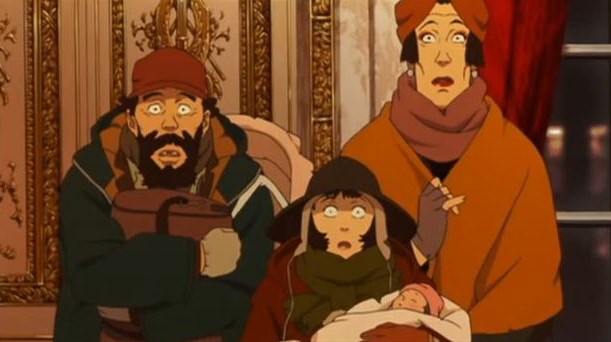When it comes to anime as a whole, a lot of people tend to think that the medium mostly consists of magical girls with long transformations, really buff men who can fire energy beams from their hands, and a massive hoard of collectible monsters that are made to sell toys. Most people probably would not know that there are many anime shows and movies that not only diverge from the examples mentioned, but also actually provide more despite its appearance.
This is where Tokyo Godfathers (2003) comes in.
Written and directed by the late Satoshi Kon, Tokyo Godfathers is an anime film that is heavily based on the 1913 novel, The Three Godfathers. In this film the story focuses on three homeless people: Gin, an abrasive alcoholic with a good heart, Hana, a transgender woman and former drag queen, and Miyuki, a young girl who ran away from home. On Christmas Eve, while searching through the garbage, they discover an abandoned newborn with a note asking the finder to take good care of her and a bag containing clues to the parents' identities. Shocked that someone would abandon a baby in the dump, the trio sets out to find the baby's parents.
Of the main characters that each gets their own equal time for development, Hana is a standout since transgender representation was very rare years ago, especially as a main character. Unfortunately, the film doesn’t really delve into the life and hardships of trans people in Japan, though that topic alone is heavy enough. And considering the heavy topic involved in the movie’s main story, it makes sense to keep the story on point, but still sad to see an opportunity pushed aside. Hana’s transsexuality isn’t used for comedy or as a shocking reveal but as a natural facet of her character. Since this film came out in 2003 there are still some dated jokes in terms of her exaggerated emotional expressions. However, you still get the sense of sadness from her station in life, not just from the bigotry she deals with but the fact that she wants to be a mother but cannot biologically be one. This helps prevent Hana from being presented as pure comic relief, an equal contributor to the story since she, like Gin and Miyuki, face their personal demons while finding the baby’s parents.
If there is a theme that can be attributed to this film it is abandonment, not just with the abandoned babe who was found in the gutters of Tokyo, but also how the three main characters have abandoned their previous lives and share the same outcome.
And throughout the course of the film they find themselves back in the company of their friends and loved ones through events of circumstance, fate, and even divine intervention, in particular around the name Kiyoko, which means “Pure Child” in Japanese. Another tidbit I noticed that adds to this is that the choir from Beethoven’s famous Symphony No. 9, also known as Ode to Joy, plays intermittently in the background. This usage isn’t forced but rather used subtly, as either foreshadowing or for a miraculous moment with one of the main characters; a nice touch that I wanted to point out.
This film also presents an issue in Japan that's been making its mark in animes and manga, depicting families in dark matters. There is no villain in this story but Tokyo Godfathers doesn’t shy away from showcasing the problems of traditional families in an increasingly fragmented and isolating society in modern Japan. In turn, this film offers a more radical but welcoming take on a family as the three homeless protagonists unknowingly form a "pseudo-family" to protect themselves from harm and overcome their personal issues. It is not blood that makes a family; it is the bonds that people make that results in one.
With that said, there is really nothing that makes this a traditional Christmas film. It's not often one finds a Christmas movie where the holiday is not even the main topic, but rather used as a film’s setting. The characters don’t even talk about the importance of Christmas and what it means since the theme of togetherness doesn’t belong to the holiday, nor is exclusive to it. If anything, this film is set before New Year’s as the countdown is used as the ticking time to find the baby’s parents. And yet, Tokyo Godfathers does work as a Christmas film since we, as an audience, see the holiday as a means to find hope, wish to escape bad situations, search for a miracle, and realize how a kind gesture can lead people from hardship.
Tokyo Godfathers is not a common Christmas story about Santa Claus, or an adaptation of a classic holiday story. But if you want a story about human kindness, forgiveness, and the miracles and circumstances that bind us all together, this is a movie that I highly recommend. Whether it's watched around Christmas or after, Tokyo Godfathers serves as a reminder that miracles can happen when you least expect it.
